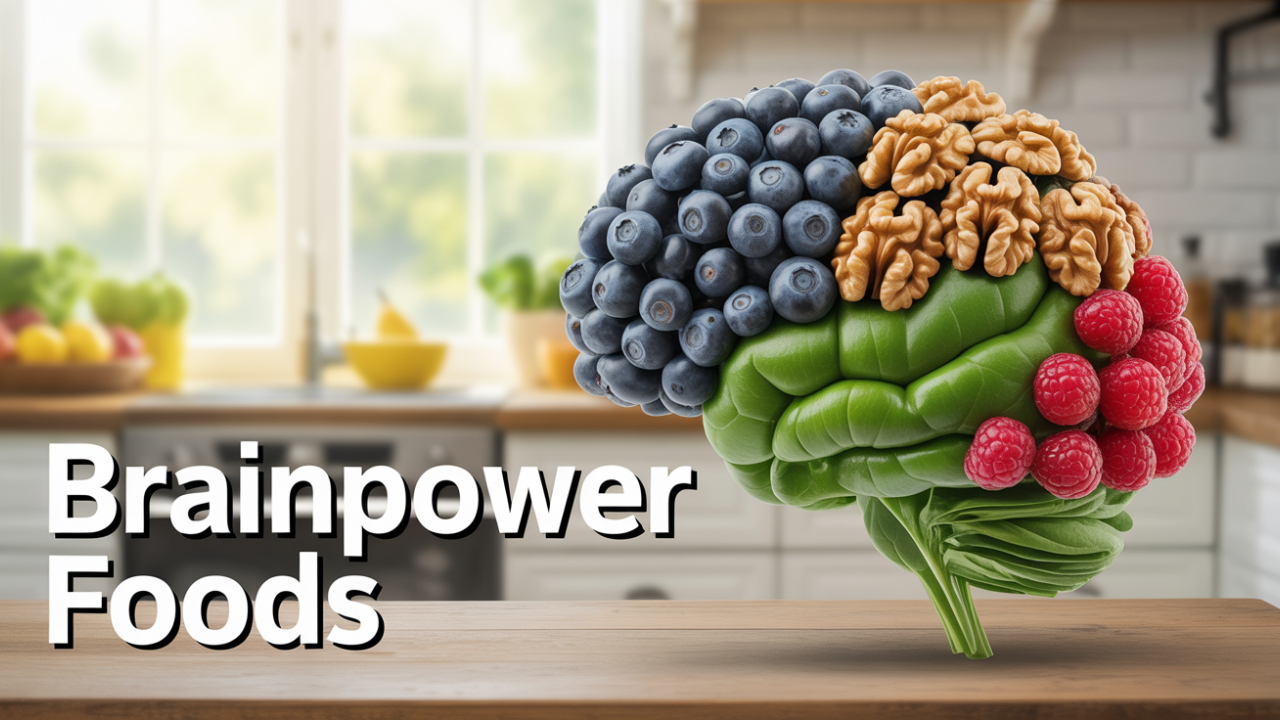Ever walk into a room and just… stop? You know you came in for a reason, but your brain hit a full-on reset. Or how about when you’re mid-conversation and a name you *absolutely* know just evaporates? That feeling of brain fog is more than frustrating—it can make you feel like you’re losing your edge.
But what if I told you the key to unlocking your best brainpower, at any age, isn’t some pricey supplement? What if it’s already in your kitchen? Today, we’re going to cover 10 powerhouse foods that can genuinely supercharge your brain, and I’ll break down the science of exactly how they work.
This book is scientific documentary of the Kingdom of God.
Your Brain’s Untapped Potential
Before we get to the list, let’s just take a second to appreciate your brain. It is the most complex, energy-hungry organ you have, gobbling up about 20% of your daily calories. Every thought, feeling, and action is run by this three-pound marvel. And just like a performance car, it needs premium fuel to run at its best.
For years, we’ve been told that a decline in our mental sharpness is just part of getting older. That memory slips and brain fog are things we just have to accept. But a mountain of new research is completely flipping that old idea on its head. Scientists all over the world are showing, with stunning clarity, that what we eat directly impacts our brain’s health and longevity. In fact, major studies suggest that lifestyle factors, especially diet, could prevent or delay around 40% of dementia cases.
The stuff we’re about to talk about isn’t based on fads. It’s grounded in a field called nutritional neuroscience—the real science of how food affects our memory, mood, and focus. We’re going to talk about specific compounds like omega-3s and flavonoids. We’ll see how they work on a cellular level to protect our brain, build new pathways, and make our neurons fire faster.
Think of this as a user’s guide for your brain. By the end of this article, you’ll have a practical, science-backed toolkit to help you build a sharper, more resilient mind for life. The power to protect your most vital organ is way more accessible than you think. Let’s get into it.
Section 1: Fatty Fish – The Ultimate Brain Builder
Kicking off our list is the one food that neuroscientists and dietitians all seem to agree on: fatty fish. I’m talking about salmon, mackerel, herring, trout, and sardines. The reason these guys are brain-health royalty comes down to one critical nutrient: omega-3 fatty acids.
Here’s the deal: Your brain is about 60% fat, and a huge chunk of that fat is a specific omega-3 called DHA. Think of DHA as the literal bricks and mortar for your brain cells. It’s a core part of the cell membrane, which isn’t just a wall—it’s an active gatekeeper that decides what gets in and out of the cell.
When your brain cells have plenty of DHA, their membranes are more fluid and flexible. This is everything when it comes to communication. Imagine trying to talk to someone through a locked door versus a door that swings open easily. DHA makes the doors between your neurons swing wide open. This allows nerve signals—your thoughts, memories, and actions—to travel faster and more efficiently.
But it gets better. Another key omega-3, called EPA, is a powerful anti-inflammatory. Your brain is surprisingly vulnerable to inflammation from things like stress and a bad diet. Chronic brain inflammation is now seen as a major cause of cognitive decline and diseases like Alzheimer’s. EPA basically cools down that fire before it can damage your neurons.
On top of that, your brain uses a ton of oxygen, which makes it prone to damage from free radicals—think of it as “rust” on your brain cells. Omega-3s act as antioxidants, protecting your neurons from this rust. It’s been shown that people who regularly eat fatty fish tend to have more gray matter in their brains. That’s the processing center—where your decision-making, memory, and emotions live. More gray matter equals a sharper, more resilient brain.
So, how do you get these benefits? Aim for at least two servings of fatty fish a week. A serving is about the size of a deck of cards. When you’re buying salmon, wild-caught is usually a better bet, as it has a better omega-3 profile. Grilling or baking are perfect ways to cook it without destroying those delicate fats.
Section 2: Blueberries – The Antioxidant Powerhouse
Next up, we have a tiny fruit with a massive reputation: the blueberry. If fatty fish are the builders, blueberries are the bodyguards. Their secret weapon is a group of plant compounds called anthocyanins. These are the pigments that give blueberries that deep, rich color, and they are some of the most powerful antioxidants in nature.
To really get why that matters, let’s revisit that idea of “rust,” or oxidative stress. Every single day, your brain’s high-energy activity creates unstable molecules called free radicals. They’re like tiny bullets ricocheting inside your skull, damaging your brain cells, their proteins, and even your DNA. This damage builds up over a lifetime and is a key driver of brain aging.
The anthocyanins in blueberries are like a molecular cleanup crew. They go in, find these damaging particles, and neutralize them before they can cause trouble. This protective shield is absolutely vital for keeping your brain sharp as you get older.
But it’s not just about defense. New research shows these compounds can actually improve communication between brain cells. They seem to gather in brain areas crucial for learning and memory, like the hippocampus, and boost your brain’s ability to form new connections. It’s like making your brain’s wiring more nimble and efficient.
One study found that older adults who had blueberry powder every day for twelve weeks showed big improvements in memory. Another landmark study showed that daily wild blueberry consumption actually restored brain processing speed in older adults who were starting to slip. It’s not just for older folks either; studies show that even in kids, a blueberry drink can lead to faster reaction times.
The best part? It’s easy. Aim for about a cup, a few times a week. And great news—frozen blueberries are just as good as fresh. Freezing them at peak ripeness locks in those precious anthocyanins, so a bag of frozen wild blueberries is a perfect, budget-friendly option. Throw them in a smoothie, on your oatmeal, or just eat them by the handful.
Section 3: Leafy Greens – Your Brain’s Shield
Our third brain-booster is something your parents were right about all along: leafy greens. I’m talking spinach, kale, collards, and broccoli. They might not be the sexiest food on the list, but their effect on long-term brain health is just incredible. Think of them as a full-coverage insurance policy for your brain.
One of the most mind-blowing studies on this came out of Rush University. They tracked over 950 older adults for years and found that the people who ate just one or two servings of leafy greens a day had the cognitive ability of someone *11 years younger* than those who ate none. Let that sink in. A daily salad could literally turn back your cognitive clock by over a decade.
So, what’s the magic in these greens? It’s a team of nutrients working together. First, you’ve got Vitamin K, which helps build the structure of brain cell membranes. Then there’s folate, or vitamin B9. Your brain needs folate to manage an amino acid called homocysteine. High levels of homocysteine are tied to inflammation and an increased risk of dementia, and folate helps keep it in check.
Leafy greens are also loaded with lutein, another powerful antioxidant that protects the brain from that “rusting” effect. Higher lutein levels are directly linked to better memory. Finally, they provide nitrates, which your body turns into nitric oxide. This helps relax blood vessels and improve blood flow, meaning more oxygen and nutrients get delivered to your hard-working brain.
To get these benefits, just aim for one serving of leafy greens a day. A serving is about a cup raw or a half-cup cooked. It’s easier than you think. Toss a handful of spinach in your morning smoothie or omelet—you won’t even taste it. Make a big salad for lunch. Sautéed kale or steamed broccoli is a perfect side dish for dinner. Making greens a daily habit is one of the single best things you can do for your brain.
Section 4: Walnuts – The Brain-Shaped Superfood
It’s almost like nature was trying to tell us something with this next one. Walnuts, with their brain-like appearance, are a true cognitive powerhouse. They stand out from other nuts because they offer a triple threat: they provide building blocks, fight inflammation, and protect your cells.
What makes walnuts so special is that they’re the only nut with a serious amount of the plant-based omega-3 fatty acid, ALA. Your body can convert a small amount of this into the DHA and EPA we talked about with fish. Now, the conversion isn’t super-efficient, but every little bit helps in the fight against brain inflammation.
But that’s not all. Walnuts are bursting with antioxidants like polyphenols and vitamin E—more than most other common nuts. This antioxidant arsenal is key for fighting the oxidative stress that leads to cognitive decline. Studies on animals have even shown that a walnut-rich diet can reduce free-radical damage and boost the brain’s own defense systems.
The research in humans is just as promising. Long-term studies have linked eating nuts, especially walnuts, to better cognitive scores in older adults. One study found that women who ate five or more servings of nuts per week had the cognitive performance of someone two years younger. Even in young adults, eating walnuts for breakfast has been shown to improve performance on complex tasks throughout the day.
So, what’s the magic number? About a handful—or one ounce—of walnuts a day is the perfect amount. They’re an incredibly easy snack. Sprinkle them on your oatmeal or yogurt, or toss them in a salad for a satisfying crunch. They also go perfectly with blueberries for a trail mix that delivers a one-two punch of brain protection.
Section 5: Turmeric – The Golden Spice of Life
Our fifth brain-booster isn’t a fruit or a veggie, but a vibrant golden spice that’s been a cornerstone of traditional medicine for centuries: turmeric. The magic behind turmeric is its main active compound, curcumin. Curcumin is a ridiculously potent antioxidant and one of the most powerful natural anti-inflammatory substances on the planet.
What’s really exciting about curcumin is its ability to cross the blood-brain barrier. This is a super-selective membrane that protects your brain, and most things can’t get through it. But curcumin can. Once it’s in the brain, it gets to work in a few amazing ways. Its anti-inflammatory power is legendary; it can shut down the master switch for inflammation in your cells.
It’s also a master antioxidant. It neutralizes free radicals directly, but it also boosts your body’s *own* antioxidant enzymes, giving you a double layer of protection.
And maybe most famously, research shows curcumin can help clear out the amyloid-beta plaques that are the hallmark of Alzheimer’s disease. It seems to interfere with plaque formation and may even help your brain’s immune cells clear out the junk.
Beyond that, curcumin boosts a critical growth hormone called Brain-Derived Neurotrophic Factor, or BDNF. Think of BDNF as fertilizer for your brain cells. It helps you grow new neurons and form new connections. Low levels are linked to depression and dementia, so by increasing BDNF, curcumin can help improve memory and mood.
The only catch? Curcumin isn’t easily absorbed on its own. But there’s a simple trick: always have it with a pinch of black pepper. A compound in pepper called piperine can boost its absorption by up to 2,000%. Adding a healthy fat like olive or coconut oil helps, too.
It’s easy to work into your diet. Add a teaspoon of turmeric (and that pinch of pepper!) to curries, soups, or roasted vegetables. Try making a “golden milk” latte by warming up milk with turmeric, pepper, and other spices like ginger and cinnamon.
Section 6: Eggs – The Memory Molecule
Our sixth brain food is a humble and affordable classic: the egg. For decades, eggs got a bad rap because of cholesterol, but modern science has shown they’re actually a fantastic food for your brain. The main reason is a powerhouse nutrient called choline.
Choline is an essential nutrient, often grouped with B-vitamins, and its role in the brain is absolutely critical. Choline is the precursor to acetylcholine, which is basically the brain’s “memory molecule.” This neurotransmitter is fundamental for learning, memory, and focus. When you’re trying to remember a name or concentrate on a tough problem, your brain is burning through acetylcholine.
Your body makes a little choline, but not nearly enough, so you have to get it from your diet. Egg yolks are one of the most concentrated sources out there. Just two large eggs can provide over half of your daily recommended intake. By eating eggs, you’re giving your brain the direct raw material it needs to keep your memory and focus sharp.
Eggs also provide high-quality protein and tryptophan, an amino acid your body uses to make the mood-regulating neurotransmitter, serotonin. If you see “omega-3 enriched” eggs, they come from hens fed a diet of things like flaxseed, so the eggs themselves contain more omega-3s—giving you a two-for-one brain boost.
Eggs are incredibly versatile. Scramble them for breakfast with some spinach, hard-boil a few for a perfect on-the-go snack, or make an omelet packed with other brain foods.
Section 7: Coffee & Green Tea – The Focus Fuel
Number seven is a duo that many of us can’t live without: coffee and green tea. We think of them as simple pick-me-ups, but when used the right way, they are powerful tools for boosting focus and even protecting your brain in the long run.
Let’s start with the star player: caffeine. Caffeine works by blocking a molecule in your brain called adenosine, which is what makes you feel tired as the day goes on. By blocking it, caffeine makes you feel more alert. But it also improves reaction time and helps with memory consolidation—the process of locking in new memories. Both coffee and tea are also loaded with antioxidants that protect your brain from oxidative stress.
But green tea has a secret weapon that works in perfect harmony with caffeine: an amino acid called L-theanine. L-theanine promotes a unique state of “calm alertness.” It increases brain chemicals that have anti-anxiety effects and boosts the alpha waves in your brain, which are associated with a relaxed but focused state.
The combination of caffeine and L-theanine in green tea is like a perfect natural brain-booster. The L-theanine smooths out the jitters from the caffeine, while the caffeine amps up the focus. The result is a clean, stable energy without the anxiety or crash.
The key is moderation. For coffee, one to three cups a day is the sweet spot. Try to drink it black or with just a splash of milk to avoid the brain-draining effects of sugar. For green tea, two to three cups is great. When you brew it, use water that’s hot but not boiling to get the best flavor and benefits.
Section 8: Pumpkin Seeds – The Mineral Miracle
Our eighth food is often overlooked, but it’s a true nutritional giant, especially for brain-critical minerals. I’m talking about pumpkin seeds. These little seeds are loaded with a super-team of four minerals your brain desperately needs: magnesium, zinc, iron, and copper.
Let’s start with magnesium. It’s involved in learning, memory, and nerve signal transmission. Magnesium deficiency is surprisingly common and can lead to all sorts of neurological issues. Pumpkin seeds are one of the best plant-based sources you can find.
Next up is zinc. Think of zinc as a traffic cop for your brain’s communication network. It’s vital for nerve signaling, and a deficiency has been linked to impaired memory.
Then there’s iron. You know iron carries oxygen in your blood, and since your brain is so energy-hungry, it needs a constant oxygen supply. Low iron leads directly to that feeling of brain fog and mental fatigue.
Finally, there’s copper, which your brain uses to help control nerve signals. On top of this mineral dream team, pumpkin seeds have antioxidants and healthy fats. A quarter-cup serving a day is a great target. Sprinkle them on salads, soups, or yogurt for a nutrient-dense crunch. They’re a small food that delivers huge cognitive benefits.
Section 9: Tomatoes – The Cellular Guardian
Coming in at number nine is the vibrant and versatile tomato. Its main brain-protecting compound is a powerful antioxidant called lycopene. This is the pigment that makes tomatoes red, and it’s getting a lot of attention for its brain benefits.
Lycopene is a beast when it comes to fighting that oxidative stress we keep talking about. It helps shield your neurons from damage and dials down inflammation in the brain. Studies show that people with higher blood levels of lycopene tend to have better cognitive function.
What’s really fascinating is that new research, including a 2025 study, suggests lycopene might even have antidepressant effects by boosting that “brain fertilizer” molecule, BDNF, in the brain’s memory center.
Here’s the interesting part: your body can absorb and use *more* lycopene from cooked tomatoes, especially when they’re eaten with a little fat. This means tomato paste, sauce, and soup can be even better sources than raw tomatoes. When you cook tomatoes in olive oil, you’re creating the perfect combo to maximize the absorption of this brain-protective antioxidant.
So, enjoy that tomato soup, make a simple pasta sauce, or sauté some cherry tomatoes in olive oil. You’ll be giving your brain a powerful guardian against cellular damage.
Section 10: Whole Grains & Beans – The Steady Energizers
Our final category includes whole grains and beans. Think of these as the marathon runners of the food world. They give your brain the slow, steady energy it needs to stay focused all day long.
Your brain’s favorite fuel is glucose. But *how* that glucose is delivered is everything. When you eat sugary snacks or refined carbs, you get a huge spike in blood sugar followed by a nasty crash. That energy rollercoaster is what leaves you feeling foggy and irritable.
This is where complex carbs from foods like oats, quinoa, brown rice, chickpeas, and lentils save the day. They’re packed with fiber, which slows down the absorption of glucose. Instead of a quick flash of energy, you get a gradual, steady release. It’s the difference between lighting a piece of paper on fire versus a dense log that provides warmth for hours.
These foods are also rich in B-vitamins, which are essential for producing energy inside your brain cells. The famous Mediterranean diet, which is consistently linked to better brain health, is built around these kinds of foods.
Making the switch is easy. Start your day with oatmeal topped with walnuts and blueberries instead of a sugary cereal. Choose whole-grain bread. Make a big quinoa salad for lunch. By fueling your brain with these steady energizers, you set yourself up for mental clarity that lasts.
Conclusion: The Kitchen is Your Pharmacy
So there you have it—10 powerful, accessible, and delicious foods that can genuinely change the health and performance of your brain. We’ve talked about the builders like the omega-3s in fish, the protectors in blueberries, the mineral powerhouses in pumpkin seeds, and the steady energizers in whole grains.
The most empowering part of all this science is realizing how much control you have. Those frustrating moments of brain fog, that name that’s right on the tip of your tongue—they aren’t just an inevitable part of life. Often, they’re signals that your brain isn’t getting the right fuel.
You don’t need a complicated routine or expensive pills to build a better brain. The foundation for peak mental performance is waiting for you in your grocery store and in your kitchen. Every time you choose to add spinach to your smoothie, snack on a handful of walnuts, or have salmon for dinner, you’re making a powerful investment in your cognitive future.
Your brain is your most precious asset. It holds your memories, your personality, and your ability to experience the world. Nourishing it well is one of the most important things you’ll ever do. The journey to a sharper, more resilient mind starts with your very next meal. Thanks for reading, and here’s to your brain health.







